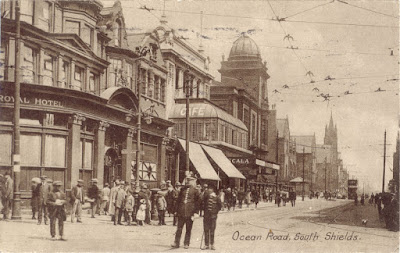We all went to see The Stranglers at Brixton Academy a few weeks ago and roundly agreed that this tune should be in the running for Mariners Tale theme tune:
The Stranglers - Toiler on the Sea
The Stranglers - Toiler on the Sea
 |
| Ocean Road in 1923 |
 In the afternoon we shifted to the breakwater mooring stern
on whit the cable our for’ard. We will remain here for several days, our cargo,
which rumour says we shall take to Antwerp, not being ready for us. The playing
cards sealed up, poker was out of the question, therefore to while away the
time we spun yarns, 'cuffers' we call them. At the start they were mostly of the
sea and shipping, but somehow or other the recounting of schoolday incidents
came uppermost. Schooldays, how dear they seem as we grow older. How we
remember the most trivial items of those bygone days. With what gusto we relate
them, and in the relating become boys again. Tempus Fugit! A few more years of
toil, and all is over. Now Myles – steady there, you are only a common Jack. Sentimentality
and the finer feelings are not for such as you. Come hail, come shine, you must meet either smilingly and
thankfully. I write this sitting up in my bunk. The watchman has just come
along and told me its 10 o'clock so I will clew up, put my scribbling tackle on
the shelf and have my usual smoke-o before sleeping the sleep of just, just so.
In the afternoon we shifted to the breakwater mooring stern
on whit the cable our for’ard. We will remain here for several days, our cargo,
which rumour says we shall take to Antwerp, not being ready for us. The playing
cards sealed up, poker was out of the question, therefore to while away the
time we spun yarns, 'cuffers' we call them. At the start they were mostly of the
sea and shipping, but somehow or other the recounting of schoolday incidents
came uppermost. Schooldays, how dear they seem as we grow older. How we
remember the most trivial items of those bygone days. With what gusto we relate
them, and in the relating become boys again. Tempus Fugit! A few more years of
toil, and all is over. Now Myles – steady there, you are only a common Jack. Sentimentality
and the finer feelings are not for such as you. Come hail, come shine, you must meet either smilingly and
thankfully. I write this sitting up in my bunk. The watchman has just come
along and told me its 10 o'clock so I will clew up, put my scribbling tackle on
the shelf and have my usual smoke-o before sleeping the sleep of just, just so.
 Hoisted two red lights well up the main rigging the signal
for the Antwerp pilot. Sighted the cutter (schooner) at little to the Eastward
of Dungeness 2:30am. Underway with pilot aboard by 6 bells. Below 4 to 8. On
coming on watch at 8 found we were in North Sea. Ship in charge of pilot. Wind
favourable. Reaching Flushing this afternoon. Changed pilots and proceeded up
the Scheldt [River]. Ship stopped at 8pm to pass, or rather, be passed by the Port
doctor. At 9 o'clock anchor was dropped (35 fathoms of cable in the water) just
below the city to await the tide. Made a move again at 10 past 10. By 12:30am
(Thursday) we were moored securely in berth 76. Siberia Dock.
Hoisted two red lights well up the main rigging the signal
for the Antwerp pilot. Sighted the cutter (schooner) at little to the Eastward
of Dungeness 2:30am. Underway with pilot aboard by 6 bells. Below 4 to 8. On
coming on watch at 8 found we were in North Sea. Ship in charge of pilot. Wind
favourable. Reaching Flushing this afternoon. Changed pilots and proceeded up
the Scheldt [River]. Ship stopped at 8pm to pass, or rather, be passed by the Port
doctor. At 9 o'clock anchor was dropped (35 fathoms of cable in the water) just
below the city to await the tide. Made a move again at 10 past 10. By 12:30am
(Thursday) we were moored securely in berth 76. Siberia Dock.